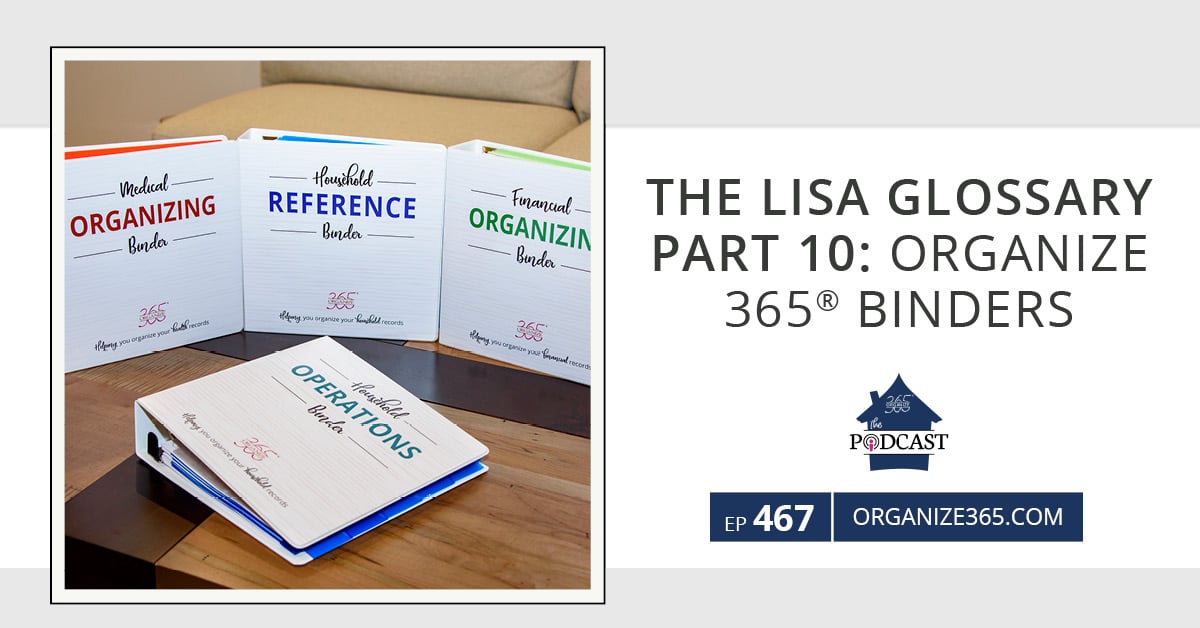
For 2022, we are adding to the Lisa glossary. This week, we are talking about ditching the file cabinet and establishing essential household binders. I also want to be your teacher to help you get your home and work papers organized and functional.
No matter when you begin your transformational journey (or when you need to reset or restart), this information will be here as a reference for you. Listen in as I teach you about the ideas and beliefs that are at the core of everything I teach and how I approach organizing.
As a professional organizer, I used to teach people how to build (and hopefully maintain) a color-coded file cabinet at home. But, in 2017, I had a sickening revelation that what I was teaching was not working. In a short time, I heard from two audience members who needed to emergently evacuate. No matter how organized their files were, their paper was not portable.
I am a functional organizer, and I learned that our paper needs to be portable and limited to a reasonable amount of space. It was time to ditch the file cabinets and organize reference papers into essential household binders.
File cabinets are typically not well-maintained and they are certainly not portable. America needs a better solution for reference paperwork.
After some ongoing analysis, I realized that household paper generally fits into four categories. I look at my own life experience caring for my ill father and settling his estate. I look at my life as a homeowner. I thought about all of the information it took to keep my household organized and my family functioning.
There were no ready-made systems for being a caregiver and executor when my father passed away. I have worked with the members of the team who have gone through similar life challenges to try and make our binders as broad and effective as possible. But, because they are binders, they can also be adapted to handle any life situation you encounter.
I created a binder for each of the four areas of essential household paperwork. Tax forms and kids’ memories live outside of this system, but everything else that needs to be saved can typically be fit into one of the four essential binders.
The Four Essential Household Binders
Organize 365® sells physical binders to help with your household paper organization. The contents for each binder are also detailed in The Paper Solution book. However, our physical binders have multiple pages of worksheets that help get the information from the many places it lives organized into one location.
Setting up the binders will make your life more organized and easier. But, it is also a gift for your family. If anyone else ever needs to take over any portion of your #adulting, they will have what they need at their fingertips.
Financial Organizing Binder
This binder details your current and future financial information. It includes retirement accounts, vehicles, insurance, home inventory, estate planning, and funeral plans.
This binder was originally designed for someone to be able to take over your financial life and close your estate. It can help with tracking bills, setting up a house, or canceling a lease.
I estimate that in order to have a comprehensive financial binder, you will get 30% from your file cabinet, 30-40% digital information, and 30-40% in your memory or on random papers in your home.
Medical Reference Binder
This binder is designed to be used mainly by a caregiver. You can set one up if you are caring for someone else, or you can set one up to make it easier for a friend or family member to care for you.
Although medical records are electronic, they are siloed in each medical practice. Many of the software systems do not effectively share information. Pharmacy, doctors, dentists, specialists, and insurance companies all have their own record systems in America.
I estimate that 5-10% of this information lives in your file cabinet right now. 40-50% is online in some kind of medical record system. The other 40-55% is not recorded anywhere (yet!).
Your medical binder is also a perfect place to keep a list of questions for your next appointment, write down observations, record behavior changes, and communicate with other caregivers.
This binder has a comprehensive workbook that includes a health history, childhood milestone tracker, symptom recorder, and place to record what you have already attempted.
Life is short and the unexpected happens. We will either need caregivers or be caregivers. Having a portable, concise medical reference binder will help you to get the best care.
Household Reference Binder
This binder is the one I use most frequently. It is designed for people who are homeowners but can be used if you rent too.
This binder is designed to have all the reference information you would keep organized if your house was a person. If you were selling your house tomorrow, you could hand over the binder to the new owners. The binder contains home improvement information, paint colors, appliance information, and landscaping details.
Typically, 80% of the contents of this binder are already in your file cabinet. Manuals, make and model numbers, serial numbers, and similar information can be stored in the binder. I also recommend keeping receipts for purchases here too so you know when it was purchased and how much it cost.
Household Operations Binder
The Household Operations binder is all of the paperwork and information you need to run your household. No matter what kind of dwelling you have, you need a place to track meal planning, cleaning schedules, events, holidays, vacations, and pet information.
As a teacher, I think of this binder as my lesson plan book for my family.
Why Binders?
Papers that live in your file cabinet are not enough for someone to come in and manage your life. Some of the information on the pages in the binder lives in your computer, in your head, and in physical places like your wallet.
File cabinets are not portable. Most of our emergencies involve leaving the house. We evacuate or lose our homes to a fire or flood. Someone gets hospitalized and we need the paperwork available for the healthcare team.
In true emergency situations, it is rare to need reference papers at home. Usually, you need them where you need to go. Papers need to be taken to a family member, a doctor, a lawyer, or a school meeting.
File cabinets hold far more information and physical paper than most of us can effectively manage. When I helped professional organization clients clean out their paperwork, most could declutter at least 80%.
What about tax paperwork?
Keep it in a file cabinet or file box. These items are bulky and rarely referenced. In a true emergency, you could replace them.
What about kid-related papers?
Kid’s School Memory Binder
Kids enjoy their own memories most when they are young and can see their own growth and progress. When your kids are in the midst of their accumulation phase or survival phase of life, they probably will not have time to sit down and look through their old math tests and spelling lists.
But, when your kids are young, you might be amazed at how much joy they get from looking at their artwork, stories, and projects. They will sit down with their binders and tell stories about school that you might not otherwise get to hear.
Have your kids help to make their own memory binder and then use them. Sit down together and see what they have to say about certificates, awards, and their own creations.
For kids who have an IEP or 504, we have the Warrior Mama binder. This is a combination of medical and educational information that will help you to keep your child’s paperwork organized and help you to advocate for his or her best education.
Walk Softly and Carry a Big Binder
My children are adopted and both needed additional support in their educational journey. I found that when I was going to advocate for my kids, I needed the medical and educational papers together for both doctor’s appointments and school meetings. I needed medical tests, health records, and learning assessments all in one place.
Your binder will hold essential details and can cut down on the time you need to spend to get your support professionals up to speed. This gives you more effective time during appointments. In my own experience, having paper documentation raises your expertise level with professionals and gives you immediate credibility.
Why Not Digital?
In all the times I have advocated for the people I love, the paper has worked best. No one has ever asked me for a digital file. Often, systems are incompatible with one another. Records from the doctor are not easily accessible by the school record-keeping system.
Paper is immediate. Sending a digital file after a meeting has not gotten the same results as passing around a physical paper during a meeting when all of the decision-makers are gathered together.
This episode is a part of the Organize 365® Glossary Playlist. Listen to other episodes on the Glossary Playlist here.



